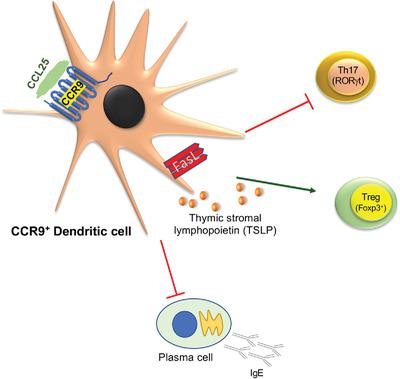当前位置:
X-MOL 学术
›
Eur. J. Immunol.
›
论文详情
Our official English website, www.x-mol.net, welcomes your feedback! (Note: you will need to create a separate account there.)
CCR9 signaling in dendritic cells drives the differentiation of Foxp3+ Tregs and suppresses the allergic IgE response in the gut.
European Journal of Immunology ( IF 5.4 ) Pub Date : 2019-12-01 , DOI: 10.1002/eji.201948327 Manisha Pathak 1 , Priyanka Padghan 1 , Namrita Halder 1 , Shilpi 1 , Neeraja Kulkarni 1 , Sandip A Sonar 1 , Girdhari Lal 1
European Journal of Immunology ( IF 5.4 ) Pub Date : 2019-12-01 , DOI: 10.1002/eji.201948327 Manisha Pathak 1 , Priyanka Padghan 1 , Namrita Halder 1 , Shilpi 1 , Neeraja Kulkarni 1 , Sandip A Sonar 1 , Girdhari Lal 1
Affiliation

|
The chemokine receptor CCR9 and its only known ligand CCL25 play an important role in gut inflammation and autoimmune colitis. The function of CCR9-CCL25 in the migration of immune cells is well characterized. However, its role in the immune cell differentiation is mostly not known. Using dextran sodium sulfate (DSS)-induced gut inflammation model, we showed that CCR9+ dendritic cells (DCs) specifically CD11b- CD103+ DCs were significantly increased in the gut-associated lymphoid tissues (GALT) compared to control mice. These CCR9+ DCs express lower MHC II and CD86 molecules and had regulatory surface markers (FasL and latency-associated peptide, LAP) in the GALT. In the presence of CCL25, CCR9+ DCs promoted in vitro differentiation of Foxp3+ regulatory CD4+ T cells (Tregs). CCL25-induced differentiation of Tregs was due to intrinsic signaling in the DCs but not through CD4+ T cells, which was driven by the production of thymic stromal lymphopoietin (TSLP) and not IL-10. Furthermore, adoptive transfer of CCR9+ DCs in C57BL/6 mice promoted Tregs but reduced the Th17 cells in the GALT, and also suppressed the OVA-specific gut-allergic response. Our results suggest CCR9+ DCs have a regulatory function and may provide a new cellular therapeutic strategy to control gut inflammation and allergic immune reaction.
中文翻译:

树突状细胞中的CCR9信号驱动Foxp3 + Treg的分化并抑制肠道中的过敏性IgE反应。
趋化因子受体CCR9及其唯一已知的配体CCL25在肠道炎症和自身免疫性结肠炎中起重要作用。CCR9-CCL25在免疫细胞迁移中的功能已得到很好的表征。然而,其在免疫细胞分化中的作用大多是未知的。使用右旋糖酐硫酸钠(DSS)诱导的肠道炎症模型,我们发现与肠道相关的淋巴组织(GALT)相比,CCR9 +树突状细胞(DC)特别是CD11b- CD103 + DC显着增加。这些CCR9 + DC在GALT中表达较低的MHC II和CD86分子,并具有调节性表面标志物(FasL和潜伏期相关肽,LAP)。在CCL25存在下,CCR9 + DC促进Foxp3 +调节性CD4 + T细胞(Tregs)的体外分化。CCL25诱导的Treg分化是由于DC中固有的信号传导引起的,而不是由于CD4 + T细胞引起的,这是由胸腺基质淋巴细胞生成素(TSLP)而非IL-10的产生驱动的。此外,CCR9 + DC在C57BL / 6小鼠中的过继转移可促进Tregs的表达,但减少GALT中的Th17细胞,并抑制OVA特异性肠道过敏反应。我们的结果表明,CCR9 + DC具有调节功能,并可能提供一种新的细胞治疗策略来控制肠道炎症和过敏性免疫反应。
更新日期:2019-12-02
中文翻译:

树突状细胞中的CCR9信号驱动Foxp3 + Treg的分化并抑制肠道中的过敏性IgE反应。
趋化因子受体CCR9及其唯一已知的配体CCL25在肠道炎症和自身免疫性结肠炎中起重要作用。CCR9-CCL25在免疫细胞迁移中的功能已得到很好的表征。然而,其在免疫细胞分化中的作用大多是未知的。使用右旋糖酐硫酸钠(DSS)诱导的肠道炎症模型,我们发现与肠道相关的淋巴组织(GALT)相比,CCR9 +树突状细胞(DC)特别是CD11b- CD103 + DC显着增加。这些CCR9 + DC在GALT中表达较低的MHC II和CD86分子,并具有调节性表面标志物(FasL和潜伏期相关肽,LAP)。在CCL25存在下,CCR9 + DC促进Foxp3 +调节性CD4 + T细胞(Tregs)的体外分化。CCL25诱导的Treg分化是由于DC中固有的信号传导引起的,而不是由于CD4 + T细胞引起的,这是由胸腺基质淋巴细胞生成素(TSLP)而非IL-10的产生驱动的。此外,CCR9 + DC在C57BL / 6小鼠中的过继转移可促进Tregs的表达,但减少GALT中的Th17细胞,并抑制OVA特异性肠道过敏反应。我们的结果表明,CCR9 + DC具有调节功能,并可能提供一种新的细胞治疗策略来控制肠道炎症和过敏性免疫反应。


























 京公网安备 11010802027423号
京公网安备 11010802027423号